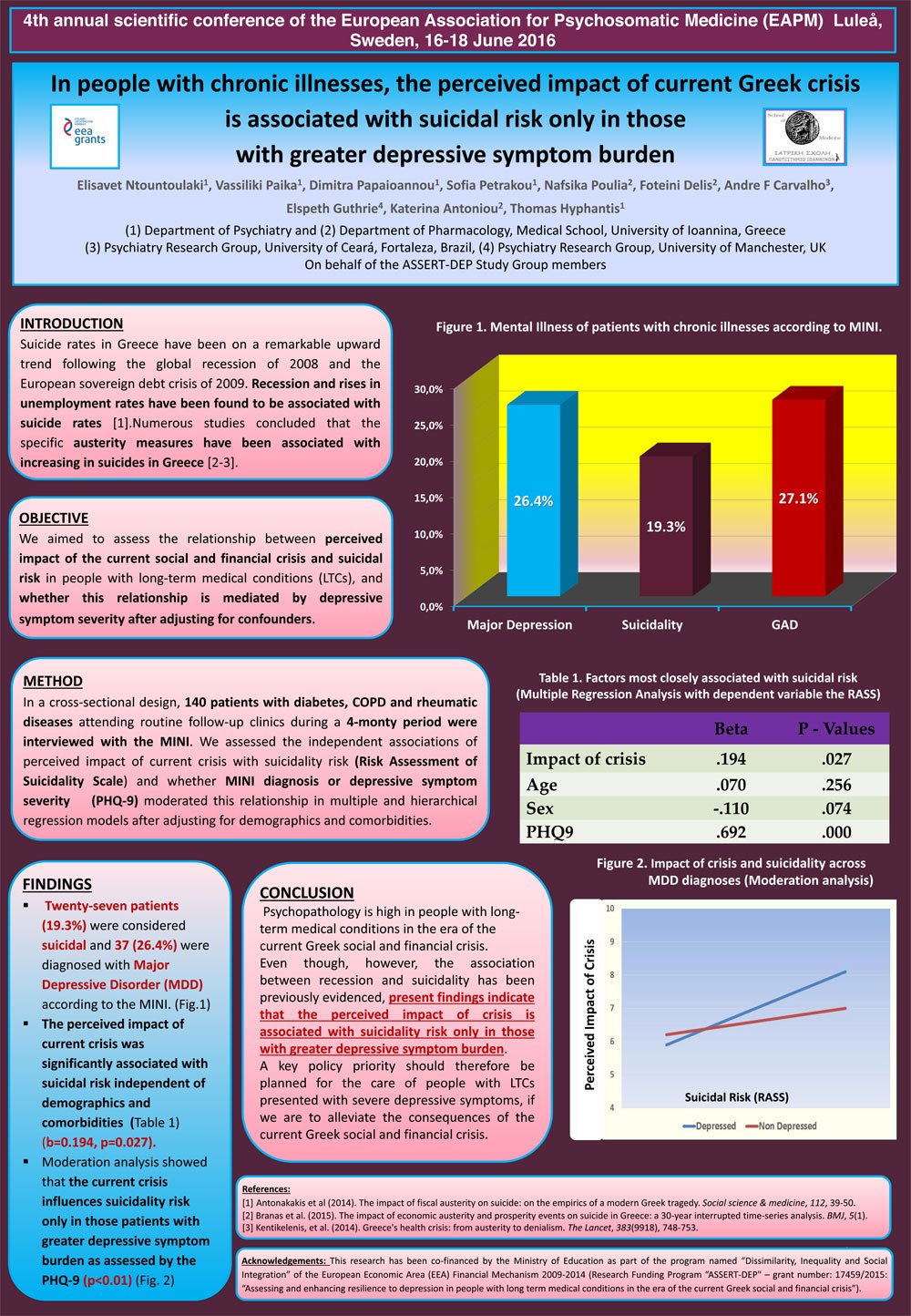Congress Communication #2
In people with chronic illnesses, the perceived impact of current crisis is associated with suicide risk only in those with greater depressive symptom burden
Elisavet Ntountoulaki, Vassiliki Paika, Dimitra Papaioannou, Sofia Petrakou, Nafsika Poulia, Foteini Delis, Andre F Carvalho, Elspeth Guthrie, Katerina Antoniou, Thomas Hyphantis
4th Annual Conference of the European Association of Psychosomatic Medicine (EAPM): Transforming Health with Evidence and Empathy, Lulea, Sweden, 16th-18th June 2016
Poster presentation awarded with "Best Poster Award"
Elisavet Ntountoulaki1, Vassiliki Paika1, Dimitra Papaioannou1, Sofia Petrakou1, Nafsika Poulia2, Foteini Delis2, Andre F Carvalho3, Elspeth Guthrie4, Katerina Antoniou2, Thomas Hyphantis1
(1) Department of Psychiatry, Medical School, University of Ioannina, Greece,
(2) Department of Pharmacology, Medical School, University of Ioannina, Greece,
(3) Psychiatry Research Group, University of Ceará, Fortaleza, Brazil,
(4) Psychiatry Research Group, University of Manchester, UK
On behalf of the ASSERT-DEP Study Group members
Objective: To assess the relationship between perceived impact of the current social and financial crisis and suicide risk in people with long-term medical conditions (LTCs), and whether this relationship is moderated by depressive symptom severity after adjusting for confounders.
Method: In a cross-sectional design, 140 patients with diabetes, COPD, and rheumatic diseases attending follow-up clinics during a 4-monty period were interviewed with the MINI. We assessed the independent associations of perceived impact of current crisis with suicide risk (Risk Assessment of Suicidality Scale) and whether depressive symptom severity (PHQ-9) moderated this relationship in hierarchical multiple regression models after adjusting for demographics and comorbidities.
Findings: Twenty-seven patients (19.3%) were considered suicidal and 37 (26.4%) were diagnosed with Major Depressive Disorder according to the MINI. The perceived impact of current crisis was significantly associated with suicide risk independent of demographics and comorbidities (b=0.194, p=0.027). However, moderation analysis showed that the current crisis influences suicide risk only in those patients with greater depressive symptom burden as assessed by the PHQ-9 (p<0.01).
Conclusion: Psychopathology is high in people with long-term medical conditions in the era of the current Greek social and financial crisis. Even though the association between recession and suicidality has been previously evidenced, present findings indicate that the perceived impact of crisis is associated with suicide risk only in those with greater depressive symptom burden. A key policy priority should therefore be planned for the care of people with LTCs presenting with severe depressive symptoms, if we are to alleviate the consequences of the current Greek social and financial crisis.
Acknowledgements: This research has been co-financed by the Ministry of Education as part of the program named “Dissimilarity, Inequality and Social Integration” of the European Economic Area (EEA) Financial Mechanism 2009-2014 (Research Funding Program “ASSERT-DEP" – grant number: 17459/2015: “Assessing and enhancing resilience to depression in people with long term medical conditions in the era of the current Greek social and financial crisis”).
Congress Communication #2.1 - Poster awarded
The Poster presentation "In people with chronic illnesses, the perceived impact of current crisis is associated with suicide risk only in those with greater depressive symptom burden" has been awarded with the "Best poster award" at the 4th Annual Conference of the European Association of Psychosomatic Medicine (EAPM): “Transforming Health with Evidence and Empathy”, Lulea, Sweden, 16th-18th June 2016.



